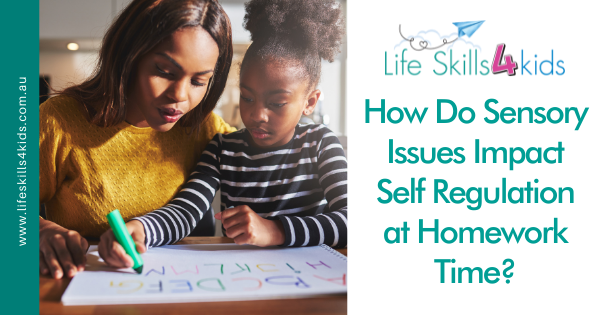Let’s see how sensory issues impact self regulation at homework time.
Okay, so you know your child has sensory issues which make it hard for them to self regulate at the best of times …. but, oh my goodness, how can you help them cope with their sensory issues when it’s time to do their homework?!
At LifeSkills4Kids, we know how hard that time of the day can be – don’t worry, we are here to provide you with lots of tips and suggestions which will help you and your child navigate homework time.
Okay, so you know your child has sensory issues which make it hard for them to self regulate at the best of times …. but, oh my goodness, how can you help them cope with their sensory issues when it’s time to do their homework?!
At LifeSkills4Kids, we know how hard that time of the day can be – don’t worry, we are here to provide you with lots of tips and suggestions which will help you and your child navigate homework time.
Top Tips to help your child with sensory issues at homework time
What about the furniture?
- We all work best when the chair/desk we use are a good fit and we can have our feet flat on the floor and be able to rest our elbows on the desk/table.
- In addition, if you child finds it hard to sit still, you could add an inflated seat cushion or a pillow – so that moving around in the seat is not a problem
- You may find that your child works best if they are seated on a large exercise ball, so that they can fidget but stay seated
- There are various seating modifications which you can buy to help your child, check out the suggestions in our article here
- Also make sure that the homework area is a place free of distracting noise
What about the lighting?
- If it’s possible, eliminate any buzzing and flickering fluorescent lighting
- Give your child input on what sort of lighting works best for them
How you can help
- Provide sensory breaks such as walking in circles, jumping on a mini-trampoline or sucking on sour candy. These will provide your child with the sensory input they need to be able to concentrate on homework tasks
- Work with your child and find out what fidget toys and type of sensory kit they need to be just right to be able to get their homework done. Don’t be afraid of accommodating some surprising requests – some kids need dark glasses, ear defenders and a stress ball; others need silly putty and headphones with music on
- Explore together what works best and help your kid focus – remember you are working on creating a ‘just right’ environment to allow them to succeed
- For further information about the Just Right Kids Technique which Deb has developed, find out more here
- Ask your kid’s school what sort of visual timetable they use and modify this for homework time.
- Remember that you and your child are the ‘experts’ in knowing what is needed to provide the right space to thrive and learn in.
Experiment Together
- You know your young person really well and it is vitally important to include them in working out the best way to succeed during their homework time
- If you can make this into a game, you will contribute to your child’s sense of fun and ownership of their learning
- Let them know it’s fine to experiment and that you want to take an active part in making a ‘Just Right’ homework space – spend some time together, planning, resourcing and creating this homework space
- Sensory processing issues can occur with any of the senses:
- Touch
- Taste
- Vision
- Hearing
- Olfactory (smell)
Other senses that may not be thought of commonly also include:
- Muscle/Body Awareness (proprioception)
- Spatial Orientation (Vestibular)
- For more information have a look at our article on finding out if your kid has sensory issues
Be flexible and listen to your kid
- There are also other factors to consider when you are helping your kid to learn to self regulate and get their homework done
- Take some time together to think about your child’s favourite type of ‘relaxing’ clothes – think easy to wear, soft, seamless and with minimum amounts of buttons or zippers. Your kid might want to always wear the same clothes – their ‘homework’ clothes as this provides a level of safety for them
- Know the signs of your kid getting anxious/worried and notice the triggers that may effect them. You may find that your child prefers to work in a space that is close to you eg in the corner of the lounge where you are or, alternatively you may find they prefer to take them themselves to a quiet space where they can be alone
- Routines: Kids with sensory issues do best when they know what to expect. Establishing consistent routines around after-school routine and homework time, will help them feel more comfortable and less overwhelmed. This is also where using visuals can be really helpful, your kid can be encouraged to follow the routine of the visuals that you use – eg, you can have a visual for what they are doing now and then for what they will be doing next. This is a very simple way to provide a timeframe to help your kid cope with homework time.
- Rewards: We all thrive on rewards and your kid is just the same in this respect! You could agree how much homework they have to complete to get a specified reward – make the rewards fun, attractive to your kid and make a big fuss of them when they achieve their agreed homework goal.
Get extra help if you need it
- At LifeSkills4Kids, we are passionate about helping kids with sensory issues
- Our expertise as Occupational Therapists can help you to find ways to make their learning a positive and enjoyable experience
- Check out our Sensory blog for some great tips and help with helping your child with sensory issues:
- Helping your child who has anxiety for sensory reasons
- Supporting emotional wellbeing at home with the help of visuals
- Supporting your child to communicate when they are anxious
- You can also download our PDF about helping kids with homework here
The Life Skills 4 Parents Membership Hub
Your one-stop-shop for everything you need to create a peaceful, structured and purposeful home.
The Program is designed to take you step-by-step through tried and true strategies to:
- Make mornings and nights easier.
- Reduce your anxiety and stress.
- Reduce the drama of family life.
The Life Skills 4 Parents Membership program will provide you with:
- 1 x LIVE Monthly parent coaching group call via ZOOM
- Access to Life Skills 4 Parents online education portal with new trainings added monthly
- Exclusive FB group with 24/7 access to our parent community and our OT team for support on the go
- Growing library of 10-minute self-paced parenting mini trainings in our Life Skills4Parents portal


